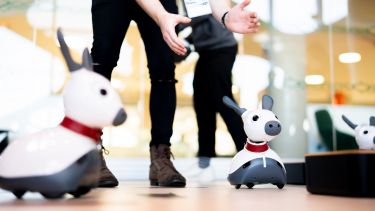Researchers from the Department are collaborating on a €3.1m project, which aims to develop artificial intelligence (AI) and robotic systems that have elements of self-awareness.
The Sheffield team, led by Professor in Cognitive Robotics Tony Prescott, is focussed on the idea of awareness in software and robots. Researchers aim to develop and test cognitive architectures - artificial computational systems inspired by the human brain - to achieve some form of awareness in software and robots.
Working with Department of Computer Science Miro-E robots, the team is exploring how robots can be used to assist, complement and build on existing therapeutic techniques. The use of animals in therapy to provide comfort and stimulation has become increasingly common in the health and social care sector in settings such as care homes and hospitals.
Inspired by this widespread impact, researchers are exploring how, with a level of self-awareness, the animal-like Miro-E robot could build on this and perform a new type of therapy.
In this scenario, the robot would have the ability to reason about the possible actions of human users. With this data, the robot would analyse the usefulness and ethical value of a range of responses available to it before making a decision. As well as providing comfort and support in a similar way to an animal such as a therapy dog, the robot could be able to do things an animal can’t, such as communicate through spoken language.
Working closely with healthcare professionals, potential end users and other collaborators, the team aims to develop specific therapeutic applications to help children and adults who are anxious or distressed.
The Horizon Europe-funded CAVAA project - Counterfactual Assessment and Valuation for Awareness Architecture - is a collaboration with 10 institutions across seven countries.
Ethical and legal considerations will inform every aspect of the CAVAA project, which will be accompanied by the development of an ethics framework set within the broader spectrum of trustworthy AI; a term used to describe AI that is lawful, ethical, unbiased and technically robust.
Tony Prescott, a Professor in Cognitive Robotics at the University of Sheffield’s Department of Computer Science, said: “Across society we’re putting machines or robots in charge of tasks that could have huge implications for health and safety. Without a level of awareness, this can be dangerous.
“So, if we can give these machines some level of awareness, they can be more adaptable, more sensitive and ultimately able to make better decisions.
“As such, the work we’re doing with our Miro-E robots is designed to give practitioners better tools to complement what they already have at their disposal.
“It’s important to emphasise that this is not about replacing therapists or human-to-human interaction, but using assistive technology to augment traditional therapeutic methods.”
In this context, the Sheffield team will be exploring weighty concepts such as what awareness is, how it can be measured and how it can be used in robots. This research will employ a variety of technologies including AI algorithms, robot programming and natural language processing, and will be underpinned by cognitive science including neuroscientific and philosophical approaches to understanding awareness.
The 4-year CAVAA project is being coordinated by Prof. Paul Verschure of Radboud University, Nijmegen, the Netherlands.


